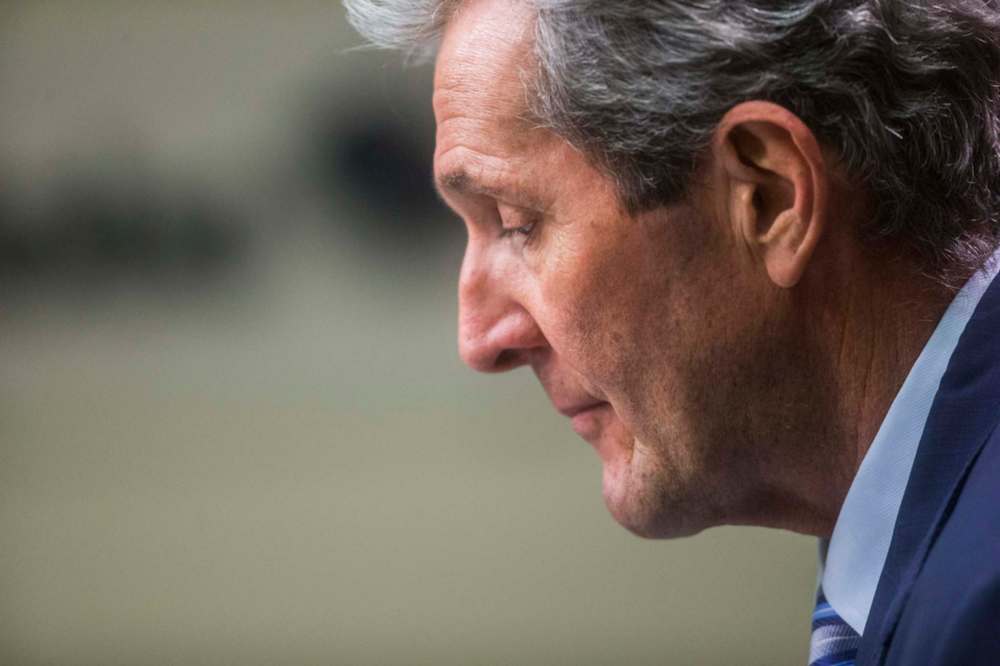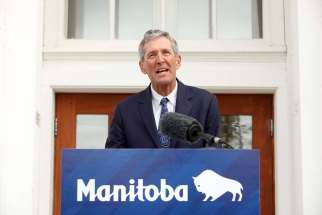Pallister decides that now is the time
Read this article for free:
or
Already have an account? Log in here »
To continue reading, please subscribe:
Monthly Digital Subscription
$0 for the first 4 weeks*
- Enjoy unlimited reading on winnipegfreepress.com
- Read the E-Edition, our digital replica newspaper
- Access News Break, our award-winning app
- Play interactive puzzles
*No charge for 4 weeks then price increases to the regular rate of $19.00 plus GST every four weeks. Offer available to new and qualified returning subscribers only. Cancel any time.
Monthly Digital Subscription
$4.75/week*
- Enjoy unlimited reading on winnipegfreepress.com
- Read the E-Edition, our digital replica newspaper
- Access News Break, our award-winning app
- Play interactive puzzles
*Billed as $19 plus GST every four weeks. Cancel any time.
To continue reading, please subscribe:
Add Free Press access to your Brandon Sun subscription for only an additional
$1 for the first 4 weeks*
*Your next subscription payment will increase by $1.00 and you will be charged $16.99 plus GST for four weeks. After four weeks, your payment will increase to $23.99 plus GST every four weeks.
Read unlimited articles for free today:
or
Already have an account? Log in here »
Hey there, time traveller!
This article was published 10/08/2021 (1582 days ago), so information in it may no longer be current.
The timing was a matter of ongoing speculation, but the announcement was a foregone conclusion.
Premier Brian Pallister’s declaration Tuesday that he will not run for re-election and plans to step down as the Progressive Conservative Party’s leader offers his government its best — perhaps only — hope of reviving its prospect of being re-elected for a third term when the next provincial vote is held.
“I believe that now is the time,” he said of his decision to leave public life and make room for a new PC Party leader. “By stepping aside at the midpoint in our second mandate, I believe this will provide sufficient time for not only for party members to choose a new leader, but for Manitobans to get to know that new leader and premier.”
Mr. Pallister did not specify when he intends to exit, but with the next election set for 2023, the midpoint of his government’s current term would be reached next month. As such, it’s reasonable to conclude the premier’s departure will occur sooner rather than later.

Recent polling has shown the PCs’ popularity in virtual freefall, owing in large part to the province’s uneven handling of the COVID-19 pandemic. An Angus Reid survey released in June showed 81 per cent of Manitobans were dissatisfied — either “somewhat” or “very” — with the government’s handling of the pandemic, and a remarkable zero per cent were “very satisfied” with the province’s response.
Also at issue, of course, was Mr. Pallister’s personal popularity among Manitobans, with approval percentage mired in the mid-30s in recent polls. Of late, the premier’s ill-considered remarks regarding colonial settlement and the legacy of residential schools drew outrage from many quarters and led to the resignation of the cabinet minister charged with Indigenous relations and reconciliation. The premier later issued a broad apology for “the misunderstanding” created by his comments, but significant damage had been done.
The episode will likely be remembered as in keeping with the Pallister brand — single-minded, forcefully opinionated, inclined toward autocratic decision-making rather than consensus-building, and very much disinclined to admit a mistake — and the fact the premier’s announced departure comes so close on the heels of the controversy suggests Mr. Pallister has in recent days engaged in a practice he has appeared mostly to eschew while in office: listening.
After nearly five years in which his cabinet and caucus remained in closely managed lockstep with whatever the premier decided, pockets of dissent had become apparent and, for the first time, other elected party members have been willing to publicly disagree with Mr. Pallister. In the aftermath of Agassiz MLA Eileen Clarke’s resignation from cabinet, a few PCs — including Families Minister Rochelle Squires and Conservation and Climate Minister Sarah Guillemard — made public comments critical of the premier’s remarks.
With those cracks appearing in the government’s public facade, one can only imagine the frank, future-focused discussion that took place in the caucus retreat in Brandon before Mr. Pallister emerged to make his announcement. By listening — to the public-approval polls, and to the inevitable concerns raised from within his government’s ranks — the premier has preserved the opportunity to leave on his own terms and give his party a chance to rebuild, rebrand and reclaim, as much as possible, the public support that has afforded it back-to-back majority mandates.
The challenge ahead for the PC Party is a daunting one. But the timing of Mr. Pallister’s departure renders the task something less than impossible.










